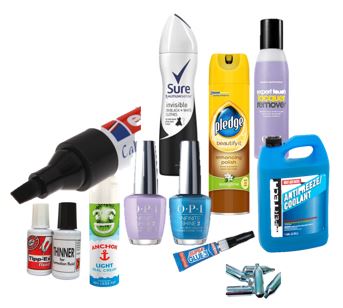The psychoactive substances act (2016) came into force to stop the sale of items that are commonly known as “legal highs”.
 A psychoactive substance is defined as one, which affects a person’s mental functioning or emotional state by stimulating or depressing their nervous system. In practice it is the same effect that we associate with controlled drugs such as hallucinations, changes in alertness, perception of time and space, mood or empathy with others and drowsiness.
A psychoactive substance is defined as one, which affects a person’s mental functioning or emotional state by stimulating or depressing their nervous system. In practice it is the same effect that we associate with controlled drugs such as hallucinations, changes in alertness, perception of time and space, mood or empathy with others and drowsiness.
Products include:
- Solvent based glues
- Correction fluid and thinner
- Marker pens
- Aerosols including deodorant, furniture polish and air fresheners
- Anti-freeze
- Nail varnish and nail varnish removers
- Nitrous oxide canister (used in whipped cream cans)
Under the regulations, retailers are expected to take reasonable steps to satisfy themselves that they are aware of the use of a potentially psychoactive substance.
Age restrictions – Although there is no legal age restriction on the sale of psychoactive substance for purposes other than consumption it is recommend that retailers voluntarily restrict sales for potential psychoactive substance for those under 18 to prevent those at risk from accessing the products.
To help you enforce this this you should:
- Make yourself aware of the substances in the pharmacy that could be psychoactive
- Place warning signs in the pharmacy to highlight your policy to customers
- Consider implementing a policy to restrict the quantity of substances being sold
If a customer comes to make a purchase for a psychoactive substance you should consider the following:
- What is the current mental/physical state of the customer? Are they drunk/intoxicated?
- What is the substance they are purchasing?
- What quantities are they purchasing?
- What else is the customer purchasing?
